Typical Flu Vaccination Failure. Public organization "Health. Informed choice!"
Currently, there are a lot of written refusals from vaccination, the largest percentage is relative to influenza vaccinations. Why can patients refuse vaccination? Are there real indications and well-reasoned reasons for refusal? And what are the consequences of not taking the flu shot?
Reasons for refusing vaccination
On the Internet, you can find a lot of information indicating the dangers of influenza vaccination and how you can make a written refusal. Describes multiple cases of development side effects and complications after vaccination. However, it is necessary to study the information in more detail and in in this case it is better to go directly to specialists with medical education.
The development of side effects or complications against the background of vaccination is possible if the patient has certain contraindications, as well as in case of exacerbation of chronic pathologies at the time of vaccination.
Regardless of the situation, vaccination is prescribed by a doctor, after determining that there are no contraindications to it. Previously released vaccines have been controversial, causing a number of exacerbations in many cases. However, today, modern pharmacology provides an opportunity to use more innovative developments that do not cause complications or side effects. Such vaccinations can be given to everyone, and even pregnant women. Before you refuse, you can look at real facts from different sides.
Nevertheless, the refusal rate of flu shots is still high, and primarily in school and preschool children. Refusal of the influenza vaccine must be justified, indicating certain reasons, which will allow it to be legally binding. A written refusal without adequate reasons raises suspicion and indicates a lack of awareness of the vaccine.
Is it possible to refuse the flu vaccine?
IN individual cases, the vaccination provokes a number of complications, but as indicated above, in the case of direct contraindications to it or with the introduction of low-quality serum. The decision to refuse to vaccinate is legal, but must be supported by certain facts.
Write a refusal to vaccinate can be based on the following contraindications:
- the presence of diseases in acute form currents;
- chronic pathologies with frequent relapses;
- various injuries suffered recently;
- hypersensitivity to the active ingredients of the serum;
- an allergic reaction to a previous vaccination.
![]()
Refusal of immunization requires a written statement from the patient and the child's parent addressed to the head of the organization / enterprise sent for vaccination. The application is written in several copies, after which it is registered with the assistant to the head of the organization. Registration of refusal to vaccinate should be carried out exclusively in the presence of the employee (signature, date, name of the assistant manager, seal of the enterprise).
Refusing vaccinations at school
Parents of a child or guardians, according to Russian legislation, may refuse to vaccinate a child under 18 years of age. For this purpose, it is necessary to draw up a written application addressed to the director of the educational institution and his temporary substitute. This document states a request to exclude any medical intervention regarding the child without the notification and consent of the parents.
The flu vaccine is not a mandatory vaccine, so parents have the right to exclude such vaccination.
You can learn more about this by examining some legislative documentation:
- Immune Prevention Act infectious diseases (article 11, part 2);
- Law on the Basics of Health Protection of Citizens.
Abstaining from vaccinations at work
To minimize the spread of the influenza virus in the country, there is a program aimed at immunoprophylaxis of the population. The use of influenza serum is still perceived with controversy, both by patients and doctors. Many enterprises, including private ones, carry out voluntary compulsory vaccination.

- workers of the agricultural structure in contact with animals, soil, plants;
- workers whose activities are related to the care of stray animals;
- staff of veterinary clinics;
- employees of communication enterprises (work with sewerage and networks);
- medical staff, laboratory assistants;
- teachers and employees of educational and preschool institutions.
Citizens who fall under another category of people have the right to refuse vaccination. At the same time, they do not have the right to refuse work or fire them, operating on the basis of lack of flu vaccination. Nevertheless, in the event of an epidemic threat, managers have the right to temporarily suspend unaccustomed employees from work.
The application for refusal of the influenza vaccination is made in writing, usually in two copies. Refusal is addressed to the full name of the head, the secretary preliminarily registers the document.
How to properly refuse vaccination
How to write a waiver? In order for the refusal to be accepted, registered, and also have legal force, the application must be drawn up according to certain samples. The addressee of the document is directly the head of the company, the director of the educational institution or the head physician of the clinic. As mentioned above, the refusal is written in two copies, then the registration takes place.
Please note that your application must be entered in the appropriate journal - the book of incoming documentation. Also, the document is assigned a number, indicated the current date, Full name of the applicant (in some cases and position), full name of the secretary / assistant who accepted the application. In the event that you are refused to accept the application, you should require a written explanation, which is the basis for going to court.

Specialists legal practice it is advised to study in advance some legislative documentation regarding vaccination. This way, you will be prepared for possible negative reactions from healthcare providers or supervisors.
Possible consequences of failure
Failure to take the flu shot has a number of consequences and is usually the responsibility of the refusal. According to the legislation of the Russian Federation, refusing to administer influenza serum entails the following consequences:
- a ban on travel to other countries where influenza vaccination is mandatory;
- in the event of an outbreak of illness or an epidemic of influenza, educational institutions may temporarily refuse to admit unvaccinated children;
- refusal to hire citizens for work related to high risk infection with viral diseases.
It is up to the person to vaccinate against influenza, he has an inalienable right to do so. However, in the absence of contraindications, experts recommend vaccinating yourself and children, thus minimizing the chance of infection with the virus. Since the flu is many times more difficult than acute respiratory infections or acute respiratory viral infections and can provoke a number of serious negative consequences for the body, refusal to vaccinate may be inappropriate.
Every year in autumn-winter season Russia is swept by a wave of all kinds of colds and infectious diseases. Some of them are tolerated by the body quite easily, while others can result in serious complications. The most common and dangerous is the flu. And every year more and more citizens are refusing the flu vaccine.
In order to minimize the consequences of influenza outbreaks in the country, a voluntary and compulsory vaccination program was introduced. Like any government intervention, vaccination was received controversially and still causes controversy among people.
Announcement of “voluntary-compulsory” vaccination appears in many enterprises and offices, causing confusion among employees and conflicts with management. The main reasons for such a resonance in society lie in the drugs themselves for immunoprophylaxis. Some citizens listen to the advice of doctors and administer vaccinations, following the orders of the management, others risk their work and health, filling out an application for refusal. Let's understand the flu shot pros and cons.
What is vaccination capable of?
Let's start with the fact that vaccination is not a medicine, but only a means of protecting against infection. However, the fact of vaccination cannot guarantee complete protection against the disease.
, a person first of all takes care of himself, since vaccination minimizes the occurrence of serious complications during infection with the influenza virus and significantly reduces the risk of infection itself.
On the other hand, vaccination orders are designed to reduce the spread of influenza. As you know, people after being vaccinated against influenza are much less likely to become carriers of an unpleasant infection.
As for the orders on compulsory vaccination in educational institutions, the risk of epidemics is the reason for universal vaccinations against influenza. The immunity of children is unpredictable, complications due to influenza occur more often and have serious consequences, so such reinsurance does not look superfluous. The staff of educational institutions is in constant contact with children, risking becoming a carrier of influenza during periods of virus activity. It is not surprising that as a result, employees of educational institutions are temporarily suspended from work. Regarding the safety and health of children, the question of whether to give flu shots to school and university staff is not worth it.

On July 15, 1999, a decree of the Government of the Russian Federation was issued, in mandatory should be put:
- working with soil, plants and water in areas unfavorable in terms of infection rates;
- working in the industry agriculture in similar areas;
- working with infected or neglected animals;
- working with sewerage facilities, communications and networks;
- healthcare workers and everyone who works with human fluids and biomaterials;
- employees of all educational institutions.
In fact, orders for universal compulsory vaccinations in offices unrelated to the activities of the above industries cannot be legal requirements. For citizens who do not fall into the conditions of the list, vaccination can only be voluntary. And this means that the question "should we give vaccinations against influenza and other diseases?" only the citizen himself can answer.
Contraindications
There are times when, while working in an industry dedicated to mandatory influenza vaccination, a person objective reasons cannot vaccinate despite the existing orders. Naturally, this cannot be a legal basis for dismissing an employee. However, as practice shows, cases of dismissal due to a reasoned refusal are not uncommon, simply motivated by other reasons. For workers in those areas that are specified in the decree of the Government of the Russian Federation, suspension from work may follow.
The official contraindications for getting vaccinated against influenza infection are:
- allergy to eggs and egg white products;
- an allergic reaction or exacerbation of a chronic illness;
- recent (less than 2 weeks) case of SARS;
- negative reactions to previous vaccinations;
- increased body temperature;
The most popular reasons for refusing vaccinations
The reasons for refusing influenza immunization are different for everyone. They can be due to personal opinion, doctor's advice, or bad experience with previous vaccinations. The decision on any medical intervention can only be made by the person himself and no one else. But once medical workers are they so zealously campaigning for the need for vaccination that prompts people to write voluntary waivers?
- the belief that vaccinations suppress natural immunity;
- the fear of getting sick precisely as a result of receiving vaccinations;
- the risk of an allergic reaction to vaccinations;
- media reports of vaccine-related complications and deaths;
- conspiracy idea of \u200b\u200bpharmaceutical companies;
- unwillingness to "follow the lead" of the state;
- vaccination orders are not legally justified.
Registration of refusal
If you have made a decision to refuse vaccination, then you need to correctly file the refusal in writing. To do this, fill out an application addressed directly to the head of the institution (head physician, director, head, etc.) in two copies. The document must be registered in the journal of incoming documentation, have the following: application number, current date, applicant's full name, position and full name of the person receiving the application and signature.
The legal basis for refusal may be "Fundamentals of the legislation of the Russian Federation on the protection of public health" or "On immunization of infectious diseases."

Before writing a waiver of medical intervention (in this case, influenza vaccination), weigh the pros and cons. Think about those close to you who may be infected by you or cause your illness. Remember that workers in the industries specified in the decree of the Government of the Russian Federation may be suspended from work for the entire season, which doctors consider dangerous in terms of an epidemic. In addition, refusal to vaccinate against any disease carries some unpleasant consequences.
Possible consequences of refusal from immunization:
- Restriction for an unvaccinated citizen to travel to countries whose visit is regulated by international sanitary and epidemiological standards or international agreements Russian Federation, requires a mark about mandatory preventive vaccinations.
- Seasonal refusal (before the end of the dangerous season) in accepting applications coming to educational and medical (health-improving) state institutions in the event of a risk of identifying massive infectious and viral diseases, or if there is a real threat of outbreaks of epidemics.
- The possibility of refusal to hire or suspension from those jobs, the performance of which directly or indirectly involves a special risk of contracting infectious diseases.
If you are firmly convinced that you do not want your children to be put in school, then you need to write an application, and it is better to do this in advance, even before the child is admitted to an educational institution. The application is made in the name of the current school director and is registered with the secretary in the journal. You must keep the second copy of the disclaimer. You can, for certainty, provide the third copy to the medical office and attach it to the child's card. It is recommended to write a refusal in a short and simple form, referring to 1-2 legal grounds and without involving arguments on medical topics.
Every year in the autumn-winter season, epidemics of infectious diseases break out, many of which can lead to severe complications and even lead to death. However, some people are negative about vaccinations and refuse to take such preventive measures.
How to legally refuse vaccinations
With the exception of some professions, Russian citizens have the right to refuse preventive flu vaccination. The Ministry of Health's law, issued in 2012, established that any medical interventionincluding preventive vaccinations, are carried out exclusively with the consent of an adult (for children - with the permission of parents or guardians).
Educational or other institutions cannot legally exclude an unvaccinated person from employment / work. The only exceptions are cases of epidemics of diseases or existing diseases against which the child or adult has not been vaccinated. The law on education of the Russian Federation speaks of granting the right to study to all citizens without exception (with or without vaccinations), regardless of their health status, therefore vaccination is not a mandatory measure.
Parents or guardians of the child can write a waiver of the flu shot for such subjective reasons:
- if they think the vaccine will do more harm than good;
- the child is sick and he needs a medical treatment (this measure only allows you to postpone influenza vaccination by certain time);
- family against vaccination for religious reasons.
Application for refusal of vaccinations
Immunoprophylaxis of influenza helps to develop a stable body defense against this dangerous infectious pathology, which often causes incurable complications - doctors never tire of repeating this, persuading parents to vaccinate their child. Nevertheless, the legislation does not prohibit abandoning such preventive measures, for which a special statement is written. The waiver of the flu shot is in writing because an oral statement has no legal effect.
How to write a refusal to vaccinate? The application is addressed to the head of the medical institution where the preventive flu vaccination is carried out. As a rule, the refusal is written in the name of the chief physician of the clinic or maternity hospital (if a newborn should be vaccinated). The application form can be asked from the employee of the medical facility, but some doctors are too categorical about the decision to refuse vaccination, so you should be ready to draw up the document yourself.
So that the health workers have no reason to reject your refusal to vaccinate, it is important to write the application correctly and correctly, otherwise you will have to redo the document several times. Consider the following recommendations when writing:
- the refusal should indicate the full personal data (surname, name, patronymic), address of residence of the applicant;
- it is advisable to refer to applicable laws, decrees and orders of the government of the Russian Federation;
- it is necessary to indicate that you refuse a specific type of vaccination or several (list their names);
- be sure to write that refusal to vaccinate is your deliberate decision and you are aware of the possible consequences.

Where to issue a waiver of vaccination
If you want to refuse the vaccination, which is given in the maternity hospital, you should draw up 3 copies of the refusal of preventive vaccination (all addressed to the head of the medical institution) and take them to the reception for registration. Applications must be assigned a number, which the secretary enters in the journal of incoming documents. You leave one copy with you, signed by an authorized employee and having a seal, the second should be pasted into the child's medical record.
IN educational institution (school or kindergarten) also require a written refusal to be vaccinated against influenza, since all preventive vaccinations take place at its base. The best solution would be to submit an application written in the form before entering the school / kindergarten along with other documents.
What does the vaccine opt-out form look like?
It is important to write your prophylactic vaccination disclaimer correctly. For this purpose, a special form is filled out, which can be asked in an educational or medical institution (clinic) or find a sample on the Internet. Study in advance legislative frameworkrelated to this issue in order to be prepared for the negative reaction of doctors. Below is a form that you can use when drawing up a waiver.
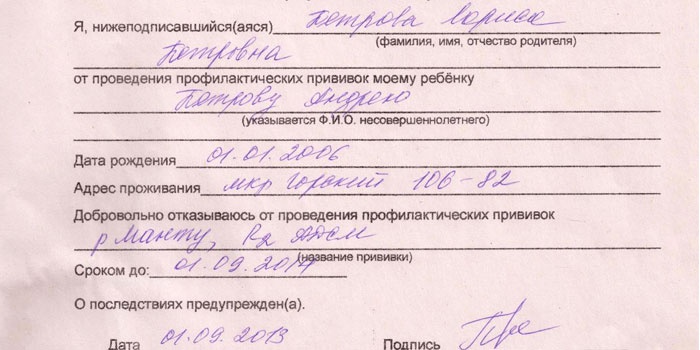
Can i opt out of flu shots?
Many explain the decision to refuse preventive vaccinations by cases of allergic and other negative reactions organism on injected serum. Complications after vaccination can be caused by poor-quality vaccine, wrong introduction injection or non-compliance with the rules of caring for the injection site. Many people consider vaccinations to be unhealthy, so they decide not to. preventive measures and this is a legal decision.
To refuse the flu shot, you must notify the clinic staff about this decision. In some cases, such a measure is objectively justified. So, contraindications for vaccination against influenza are:
- the presence of an acute illness;
- chronic illness in a recurrent form;
- recent trauma;
- an allergic reaction to a previous vaccine administration.
To refuse immunization, you should draw up a statement addressed to the head of the organization that sends you to the procedure, making one copy for yourself. The document is registered with the secretary of the head of the organization, while the date of acceptance, the signature with a decryption is put on it (the name of the employee who accepted the paper and his position is indicated), the incoming number and seal.
At school
Parents can refuse any medical intervention in relation to their minor child. For this, an application is drawn up addressed to the school director or teacher who is temporarily performing his duties. In this case, the document should include a request to release the son / daughter from any medical proceduresconducted without the consent of parents or legal guardians.
Flu vaccination is not a mandatory measure, so parents have the right to write a waiver of such a preventive intervention. You can rely on:
- Law 3323-F3 (Articles 19 and 20);
- Law on Immunoprophylaxis of Infectious Diseases (2nd part of Article 11);
- Law on the Prevention of the Spread of Tuberculosis in the Russian Federation (3rd part of Article 7).

At work
To minimize influenza infection in the country, an immunization program is being carried out. Like any medical intervention, vaccination is perceived by specialists and ordinary people ambiguously, causing controversy and disagreement. Enterprises of various industries and specializations carry out voluntary-compulsory prevention of influenza: some employees listen to the recommendations of doctors and carry out the orders of their superiors, others issue a refusal.
According to the decree of the Russian government of 15.07.99, the following categories of citizens at risk of infection must be vaccinated:
- working with plants, soil, water, in areas with a massive spread of infections;
- working with homeless, infected animals;
- agricultural workers in areas with poor infection rates;
- employees of educational institutions;
- working with communications, sewerage facilities, networks;
- employees of medical institutions, laboratories.
All other citizens have the right to file a refusal to take influenza vaccinations, but at the same time they cannot be fired from their jobs or not hired by the heads of organizations that are not related to the above industries. For other people, vaccination is carried out exclusively on a voluntary basis. With the threat of an epidemic, however, management has the right to remove unvaccinated employees from work until the threat of infection passes.
The refusal statement is submitted in writing and is drawn up in the available form. The paper is addressed directly to the head of the company where the person works. To be able to challenge the decision, you should make 2 copies of the paper and keep one for yourself. The document must be registered at the reception, where the secretary gives him the registration number, marks the date of the appointment and puts his signature.
Video
Since flu epidemics begin every year, the likelihood of serious illness, complications and even death increases. However, despite this, today you can often find a negative attitude towards vaccination, although officially it is considered the most effective immunoprophylaxis of infectious diseases. In principle, it is everyone's personal right to refuse the flu shot. No one can impose on you similar way protection from an illness, especially if you find something reprehensible in it... Whether it is worth giving up is another matter. All this should be discussed in more detail.
Real discussions about vaccine denials


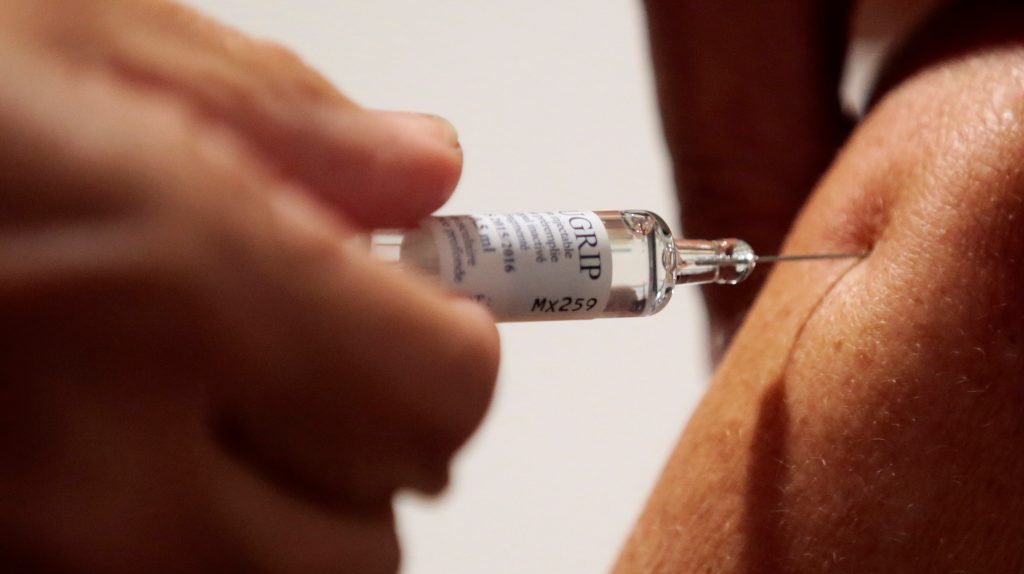
Everyone has the right to refuse vaccination
In principle, only representatives of certain professions are obliged to vaccinate. All other people have the right to decide for themselves whether they need vaccinations or not. This right is guaranteed by a law issued by the Ministry of Health back in 2012: it says that for any medical intervention (which, of course, vaccination can also be attributed), the consent of the person is required (if we are talking about minors, parents or guardians make the appropriate decisions for them. ).
The same applies to students in various educational institutions... The leadership of these organizations cannot threaten students with disqualification from classes because they have not passed the described preventive procedure. In any case, it would be a violation of the law.
As an exception, cases of serious mass epidemics and the corresponding decrees of the ministry and / or regional departments should be indicated.
Parents of children for refusing flu shots may have such reasons:
- when it is believed that the vaccine will harm the child;
- if necessary, a medical outlet due to a child's illness;
- there are religious beliefs against vaccination.
Thanks to immunoprophylaxis, the human body develops stable protection against infection. Here's what to consider for those who are considering whether to agree to the vaccine or not.
It should not be forgotten that a disease such as the flu is often accompanied by dangerous complications.
However, if the parents nevertheless decided to refuse, they need to write a corresponding statement. The oral version of the application has no legal force.
How to write a statement
It is important to note that the application for the waiver of the influenza vaccine must be addressed to the person who runs the medical institution that provides the preventive vaccination.
Traditionally, the name of the chief physician is indicated in such paper (if we are talking about vaccination for a newborn, the application is written in the name of the head of the maternity hospital).

A declaration of refusal to vaccinate must be in writing
The form can be asked at the reception of the medical institution. At the same time, a certain factor should be taken into account: some doctors categorically do not want to accept refusal. You should not be too nervous and worried about this, because this document it will turn out to compose yourself.
The preparation of the application must be correct and without errors, which excludes the possibility of its rejection by health workers. Of course, even if you reject it, you can always redo it, but isn't it better to do it once carefully and accurately than to rewrite it many times later. Here are a few guidelines to consider when filling out the document:
- it would be nice to refer to the current legal regulations and government orders;
- complete personal data must be indicated, that is, name and address of residence;
- you need to clarify which vaccination you refuse (there may be several of them)
- it is worth pointing out that the decision to refuse is deliberate, with the awareness of all possible consequences.
When a refusal is made in a maternity hospital, three copies of such a statement are traditionally drawn up, addressed to the head of the clinic. The reception desk accepts them for delivery and registration.
The document is numbered and entered by the secretary in the journal of incoming documentation. You can take a copy with you to paste it into the child's medical card (make sure that it be signed and stamped).
If children are brought up in kindergarten or go to school, be prepared for the fact that these institutions will also require a written refusal, since preventive vaccinations are carried out on a regular basis.
For correct filling it is advisable to use a special form. If necessary, finding it on the network will not be difficult. It would be nice to study, if possible, at least partially the legislative framework that relates to this issue, which will help you to properly respond to negative reactions from outside. medical professionals (alas, anything can happen, so you need to be prepared for this).
Reasons and justifications for refusal
Sometimes people make the rationale for such a decision allergic reactions after injection. It's really, good reason, since some have intolerance to certain components of the vaccine - most often, allergy to chicken protein (most modern vaccines are made on its basis).
Sometimes the causes of complications after vaccination are:
- poor quality vaccine;
- incorrect injection;
- improper care of the skin area where the injection was made.
For some people, vaccines are harmful to health. Of course, such an opinion is quite controversial, and, if necessary, it can be challenged only by facts. However, complete legal right these people - to refuse the procedure, no matter for what reason they want to do it.
There are some contraindications to influenza vaccination, in which refusal is an objectively justified measure:
- aggravation chronic illness or its relapse;
- acute period of any disease (for example, heat with a cold);
- recent injuries;
- allergic and other negative reactions noted after the previous injection.
A pattern of not getting a flu shot will special labor find it on the Internet. However, why search? Here is one possible sample below.

This is what a statement about the refusal of preventive vaccinations may look like.
With regard to specific laws that can be relied on, thus justifying their reluctance to get vaccinated before doctors, the following are recommended:
- 19, as well as 20 article of the law 3323F3;
- 11 article of the law on immunization of infectious diseases;
- 7 article of the law on the prevention of tuberculosis spread.
Agree that references to laws will sound much more convincing than all other arguments. As a rule, after that, doctors always agree with the voiced refusal, no matter how actively they argued their arguments “against” a minute before.
Vaccinations at work
To minimize the spread of influenza in our country, an immunization program is being carried out.
People in the street often perceive this procedure ambiguously (it must be admitted that almost all types of medical intervention are treated with distrust in our country). At least, there have been plenty of disputes about this case for a long time already - and it seems that the doctors were able to demonstrate on the facts that vaccination, in fact, allows you to form strong immunity and protects against the flu. However, the distrustful and doubting, one way or another, remains a considerable number, and this is their full right.
In various industries and areas of activity at enterprises, the following flu prevention is carried out every year:
- officially voluntary;
- in fact - compulsory.
However, the employer has no right to insist on the need to get vaccinated, no matter what good intentions such decrees are dictated to him. That is, it cannot be official reason layoffs from work (although, of course, we all live in modern world and we understand what the postscript "official" means - an unscrupulous employer will always find a reason to fire an employee who refuses to follow his instructions).
But there are certain professions whose representatives must be vaccinated against influenza annually according to legal requirements (in particular, by government decree of July 15, 1999). Here are some of them:
- work with crops, water, soil;
- work with animals that do not have a home and / or are infected;
- agricultural activities - especially in areas where the infection is spreading massively;
- educational institutions (teachers working in them);
- services working with sewerage facilities and other communications;
- medical institutions and laboratories.

People who work with stray animals usually need a flu shot
All other citizens can safely refuse vaccination if for some reason they consider this procedure inappropriate for themselves. Leaders are not entitled to impose a penalty for this, and, moreover, to dismiss.
However, if there is real threat epidemic, the management has the right to remove unvaccinated workers from work for the entire period.
How to write a waiver of the flu shot at work? In principle, the same as in all the cases mentioned above:
- The application is made in writing addressed to the manager.
- A couple of copies are required, one of which remains with you and the other at work.
- Registration is required at the reception with numbering, date of admission stamp and signature of the secretary.
In principle, there is nothing super complicated in this. The main thing is, act rationally and carefully, so as not to provoke the anger of the bosses and not to face unnecessary problems in the future (by and large, the boss may not care if you get vaccinated or not, but not everyone likes it when their instructions are not followed or some employees start to stand out) ...
Should I refuse?
Nevertheless, think again - is it worth it to refuse vaccination? Still, even statistical data confirm that this procedure turns out to be better prevention from the flu.
This is not to say that vaccination is 100 percent capable of providing protection against infection. However, 70 percent of vaccinated people still do not get sick during an epidemic, and in cases where infection does occur, they manage to do without complications and serious consequences.
As you know, every year the influenza virus mutates, but it still remains the influenza virus (albeit with certain variations). In this case, it is appropriate to recall such a concept as "cross-immunity", that is, the presence after vaccination in human body antibodies that can work not only against a specific viral strain, but also against some other antigens.
The dangers associated with vaccination are often possible due to incorrect vaccination. For example, it is advisable to make an immunogram before being vaccinated (especially for children) - such a procedure will help to find out the state of immunity. This is very important, because with a weak immune system, there is a possibility of getting the flu as a result of the injection (a weakened or inactivated viral strain is injected into the body along with the vaccine).
As noted above, negative consequences after vaccination, they also appear in cases where a person has an allergy or an individual intolerance to the components of the vaccine.
Therefore, it is important for the doctor to first find out if the patient has possible contraindications against the upcoming immunoprophylaxis procedure, and only then proceed to injections.
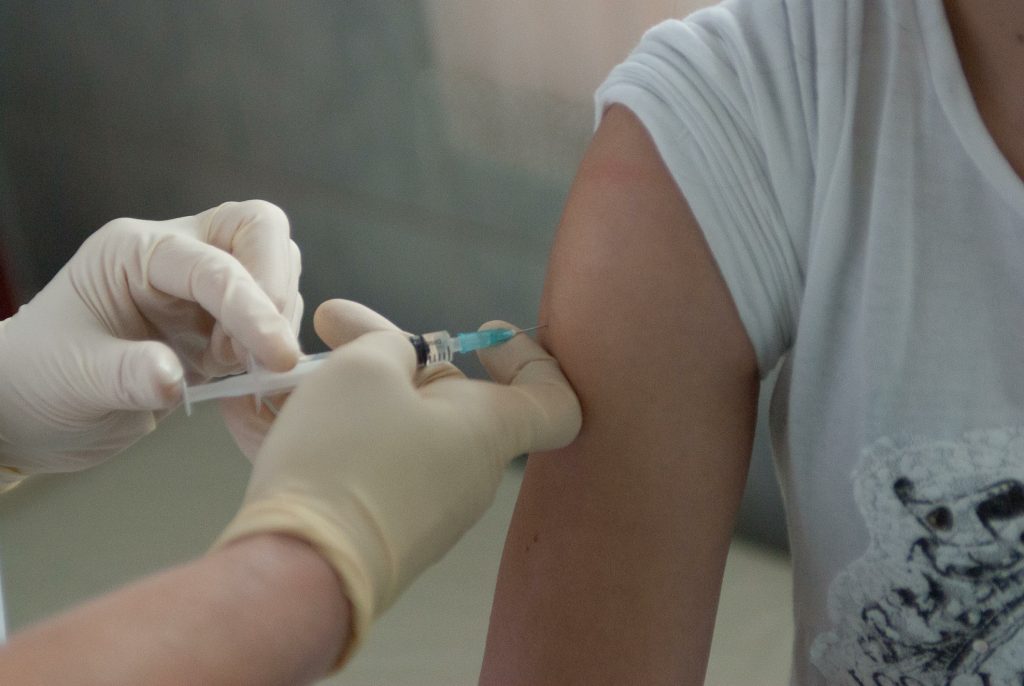
Consider the benefits of vaccination when deciding
Other prerequisites negative attitude vaccinations may be caused by unconfirmed rumors. A person tends to distrust achievements modern medicineeven if the facts suggest otherwise.
Nevertheless, you have every right to refuse the flu shot, if for some reason you do not want to carry out such a procedure. Such a decision will be your personal action and, accordingly, for his possible consequences you are solely responsible.
Written denial of the flu shot
During the period of an increased epidemiological threshold of the incidence of influenza, mass vaccination of the population is carried out, which allows avoiding infection with the virus and possible complications. Doctors everywhere promote the need for vaccination, but many do not dare to vaccinate and refuse it, arguing their decision different reasons... At the moment, you can find a huge amount of material about the dangers of the influenza vaccine, but medical specialists assure the safety of vaccination and strongly recommend protecting against the virus in advance. In cases where a person does not want to vaccinate for one reason or another, it is necessary to write a refusal to vaccinate against influenza.
Refusing influenza vaccination: indications
Currently, the influenza vaccine is considered the most effective method prevention of disease. The flu itself is not so dangerous, but its complications often lead to grave consequencesincluding lethal outcome... Most often, against the background of influenza, they develop severe forms pneumonia. In children, the flu can provoke otitis media, bronchitis, meningitis and other diseases that are difficult to treat. Despite possible risks, many still refuse the vaccine, citing the fact that after vaccination complications can be much more serious than after the flu, and also by the fact that even after being vaccinated, the risk of getting the flu remains. In some cases, refusal from the vaccine is justified, since it cannot be given to those who are allergic to chicken protein or have a history of severe autoimmune diseases... With caution, the vaccine should be approached by pregnant women, especially in the first 14 weeks of pregnancy, as well as the elderly and children who have previously had side effects from vaccination.
 Contraindications to the flu shot
Contraindications to the flu shot
Quite often, young parents refuse the vaccine, citing the fact that they are worried about the health of their child and are not sure how their child's body will behave after vaccination. Among some doctors, you can also find opponents of vaccination, because they believe that by doing the vaccine, there is a direct intervention in immune system human. Others are of the opinion that the flu virus is fed with mutations every year and it is not a fact that the vaccination will help protect against a certain stamp of the virus. In any of the cases, if a person has decided not to vaccinate against influenza, he needs to write a refusal, which is official document and confirms the person's opinion.
Sometimes the reluctance to vaccinate can be reported orally, but then the responsibility in cases of infection will lie with the clinic staff. Also, having issued a written refusal, parents can be sure that their child in a preschool or school institution will not be vaccinated. If medical workers have in their hands a refusal to vaccinate a person living in their area, then they are completely relieved of responsibility in cases of infection of this person.
How to refuse vaccination
Refusal of influenza vaccination, sample - issued by a medical officer of the clinic where the vaccination is carried out. If a person refuses the vaccination in writing, then in special magazine a refusal is recorded at the polyclinics, and the statement of refusal is forwarded to the head physician. It is necessary to issue a refusal to receive a flu shot in the name of the chief physician or head of the institution where the vaccination is carried out. The refusal sample must contain the following information:
- surname, name and patronymic of the applicant;
- passport details and registration address;
- the name of the vaccine that the person refuses;
- rejection reason;
- the statement itself;
- date and signature.
In the application, you need to explain in detail the reason why the person refuses the vaccination. It is also necessary to indicate that in cases of infection, you take responsibility for yourself and will not make claims against medical workers.
 Form to fill out when refusing preventive influenza vaccination
Form to fill out when refusing preventive influenza vaccination
Vaccination waiver must be made correctly and meet all legal requirements.
Possible consequences of not getting the flu shot
Quite often, refusal of vaccination is not reasoned important reasons, but no one has the right to vaccinate in a forced form. If a child is vaccinated, the parental permission must be given. It is important to remember that citizens who refuse preventive vaccination risk both their health and the health of those around them, since in case of infection, they will be the first source of illness. Quite often, those who were not vaccinated during the epidemic are not allowed to schoolwork or visiting kindergarten... For adults, refusal to vaccinate may result in the inability to leave the country or get a job. Also, refusal to vaccinate significantly reduces the chances of reducing the incidence among the population.
 Flu shot - to do or not
Flu shot - to do or not
The influenza virus spreads rapidly among the population and leaves behind severe complications. Getting a flu shot does not protect a person from infection, but it significantly reduces the risk of complications. Since after the vaccine and the introduction of virus particles into the body, antibodies are produced, which, after infection with influenza, are activated and destroy the influenza virus. That is why even if a person gets sick with the flu after being vaccinated, the risk of complications is minimal, and the disease itself will be mild. A flu shot - whether or not to do it is up to the person himself, but in any case, if there are no contraindications to the vaccine, it is better to do it and protect yourself and your family from the disease in advance. If in doubt, you need to consult with a local therapist or pediatrician who has been leading a person for several years and is well acquainted with the characteristics of his body.
Read also on this topic:
http://antirodinka.ru
Every year, in the autumn-winter season, epidemics of infectious diseases break out, many of which can lead to serious complications and even lead to death. However, some people have a negative attitude towards vaccination and refuse such preventive measures.
How to legally refuse vaccinations
With the exception of some professions, Russian citizens have the right to refuse preventive flu vaccination. The Law of the Ministry of Health, issued in 2012, established that any medical intervention, including preventive vaccinations, is carried out exclusively with the consent of an adult (for children - with the permission of parents or guardians).
Educational or other institutions cannot legally exclude an unvaccinated person from employment / work. The only exceptions are cases of epidemics of diseases or existing diseases against which the child or adult has not been vaccinated. The law on education of the Russian Federation speaks of granting the right to study to all citizens without exception (with or without vaccinations), regardless of their health status, therefore vaccination is not a mandatory measure.
Parents or guardians of a child can write a refusal of the flu shot for such subjective reasons:
- if they think the vaccine will do more harm than good;
- the child is sick and needs a medical treatment (this measure only allows you to postpone influenza vaccination for a certain time);
- family against vaccination for religious reasons.

Application for refusal of vaccinations
Immunoprophylaxis of influenza helps to develop a stable body defense against this dangerous infectious pathology, which often causes incurable complications - doctors never tire of repeating this, persuading parents to vaccinate their child. Nevertheless, the legislation does not prohibit abandoning such preventive measures, for which a special statement is written. The waiver of the flu shot is in writing because an oral statement has no legal effect.
How to write a refusal to vaccinate? The application is addressed to the head of the medical institution where the preventive flu vaccination is carried out. As a rule, the refusal is written in the name of the chief physician of the clinic or maternity hospital (if a newborn should be vaccinated). The application form can be asked from the employee of the medical facility, but some doctors are too categorical about the decision to refuse vaccination, so you should be ready to draw up the document yourself.
So that the health workers have no reason to reject your refusal to vaccinate, it is important to write the application correctly and correctly, otherwise you will have to redo the document several times. Consider the following guidelines when writing:
- the refusal should indicate the full personal data (surname, name, patronymic), address of residence of the applicant;
- it is advisable to refer to the current laws, decrees and orders of the government of the Russian Federation;
- it is necessary to indicate that you refuse a specific type of vaccination or several (list their names);
- be sure to write that refusal to vaccinate is your deliberate decision and you are aware of the possible consequences.
![]()
Where to issue a waiver of vaccination
If you want to refuse the vaccination, which is given in the maternity hospital, you should draw up 3 copies of the refusal of preventive vaccination (all addressed to the head of the medical institution) and take them to the reception for registration. Applications must be assigned a number, which the secretary enters in the journal of incoming documents. You leave one copy with you, signed by an authorized employee and having a seal, the second should be pasted into the child's medical record.
The educational institution (school or kindergarten) also requires a written refusal of the flu shot, since all preventive vaccinations are carried out on its basis. The best solution would be to submit an application written in the form before entering school / kindergarten, along with other documents.
What does the vaccine opt-out form look like?
It is important to write your prophylactic vaccination disclaimer correctly. For this purpose, a special form is filled out, which can be asked at an educational or medical institution (clinic) or find a sample on the Internet. Study the legal framework related to this issue in advance in order to be prepared for a negative reaction from doctors. Below is a form that you can use when drawing up a waiver.
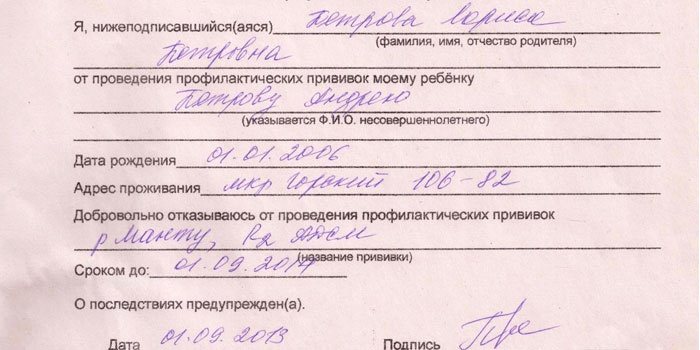
Can i opt out of flu shots?
Many people explain the decision to refuse preventive vaccinations by cases of allergic and other negative reactions of the body to the injected serum. Complications after vaccination can be caused by a poor-quality vaccine, inappropriate injection or non-compliance with the rules of caring for the injection site. Many people consider vaccinations to be unhealthy, so they decide to skip this preventive measure and this is a legal decision.
To refuse the flu shot, you must notify the clinic staff about this decision. In some cases, such a measure is objectively justified. So, contraindications for vaccination against influenza are:
- the presence of an acute illness;
- chronic disease in a relapsing form;
- recent trauma;
- an allergic reaction to a previous vaccine administration.
To refuse immunization, you should draw up a statement addressed to the head of the organization that sends you to the procedure, making one copy for yourself. The document is registered with the secretary of the head of the organization, while the date of acceptance, the signature with a decryption is put on it (the name of the employee who accepted the paper and his position is indicated), the incoming number and seal.
Refusing vaccinations at school
Parents can refuse any medical intervention in relation to their minor child. For this, an application is drawn up addressed to the school director or teacher who is temporarily performing his duties. In this case, the document should include a request to release the son / daughter from any medical procedures that are carried out without the consent of the parents or legal guardians.
Flu vaccination is not a mandatory measure, so parents have the right to write a waiver of such a preventive intervention. You can rely on:
- Law 3323-F3 (Articles 19 and 20);
- Law on Immunoprophylaxis of Infectious Diseases (2nd part of Article 11);
- Law on the Prevention of the Spread of Tuberculosis in the Russian Federation (3rd part of Article 7).

How to refuse vaccinations at work
To minimize influenza infection in the country, an immunization program is being carried out. Like any medical intervention, vaccination is perceived by specialists and ordinary people ambiguously, causing controversy and disagreement. Enterprises of various industries and specializations carry out voluntary-compulsory prevention of influenza: some employees listen to the recommendations of doctors and carry out the orders of their superiors, others issue a refusal.
According to the decree of the Russian government of 15.07.99, the following categories of citizens at risk of infection must be vaccinated:
- working with plants, soil, water, in areas with a massive spread of infections;
- working with homeless, infected animals;
- agricultural workers in areas with poor infection rates;
- employees of educational institutions;
- working with communications, sewerage facilities, networks;
- employees of medical institutions, laboratories.
All other citizens have the right to file a refusal to take influenza vaccinations, but at the same time they cannot be fired from their jobs or not hired by the heads of organizations that are not related to the above industries. For other people, vaccination is carried out exclusively on a voluntary basis. With the threat of an epidemic, however, management has the right to remove unvaccinated employees from work until the threat of infection passes.
The refusal statement is submitted in writing and is drawn up in the available form. The paper is addressed directly to the head of the company where the person works. To be able to challenge the decision, you should make 2 copies of the paper and keep one for yourself. The document must be registered at the reception, where the secretary gives him the registration number, marks the date of the appointment and puts his signature.
http://vrachmedik.ru
Is it possible to refuse an optional vaccination?
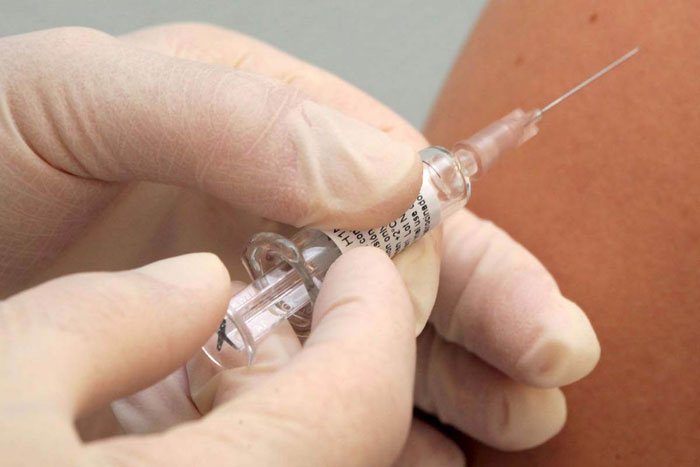
Currently, influenza vaccination is the only measure offered by health care providers to prevent disease during periods of an ARVI outbreak. observed mainly in the autumn-winter season. However, according to the results of the last scientific research, both domestic and foreign, influenza vaccination is nowhere near as useful as it was thought until now. It does not provide any tangible guarantee that the person receiving the vaccine will not get sick. Therefore, more and more people refuse to receive vaccinations, and parents can do this for minor children. However, refusing the flu shot is still perceived as hostile by health care providers. Parents of unvaccinated children often face problems with admission to educational institutions or obtaining a medical card. and adults may be denied employment. To avoid such problems, you need to know your rights and be able to protect them.
Today, it is a legal right of every person to refuse the flu shot. It is enshrined in the law of the Russian Federation of 17.09.1998 N157-F3 "On Immune Prevention of Infectious Diseases". According to this law, every citizen of the Russian Federation has the right to refuse to vaccinate against the following infectious diseases:
What is the reason for the refusal of the flu shot?
According to scientific research, the influenza vaccine becomes a barrier only against the type of virus from which it was made. And since to date more than 200 strains of the influenza virus have been identified, the number of which continues to grow steadily, it is simply unrealistic to create a vaccine that would protect against all of them. In addition, it is impossible to predict which type of virus will be active in the coming season. Consequently, the flu vaccine loses its usefulness. Thus, avoiding the flu shot is justified for both adults and children.
However, today in educational institutions there is a practice of so-called "voluntary-compulsory" vaccination against influenza. Parents are described all sorts of serious consequences for the child's health if a refusal of the flu shot is written, or they are threatened with administrative sanctions, for example, in the form of expulsion from kindergarten or school. Remember that all such actions are illegal. No one has the right to force you to be vaccinated against infectious diseases included in the above list! Such requirements become legal only in the event of a mass epidemic.
How to deal with the refusal of the flu shot
If you have made a decision not to take the flu shot, you should write a statement to the manager of the organization to which the statement will be submitted. Parents write an application for minor children. It is written in two copies, one of which remains with the submitter.
Make sure the accepted application is registered. The sample of a citizen indicates the registration number, full name and position of the employee who received the application. If you refuse to accept an application, you must require a written justification, which in the future will serve as the basis for filing a lawsuit.
Flu shot refusal pattern
In order to document your refusal to vaccinate influenza, the sample can be submitted either in the form of an official form approved by the Ministry of Health of the Russian Federation, or formulated in any form.
An arbitrary form might look like this.
The position of the head of the organization where the application is submitted
I, full name, refuse the flu shot based on:
- Law of the Russian Federation of 22.07.1993 N5487-1, and its article N 33 "Refusal of medical intervention";
- Law of the Russian Federation of 17.09.1998 N157-F3 "On Immune Prevention of Infectious Diseases", Article N5 "Rights and Obligations of Citizens in Immune Prophylaxis".
The refusal of the flu shot, formulated by the parent for his own minor child... In the application, you must indicate the child's first and last name, his age, confirm that you refuse the flu shot and add that you have been informed about possible complications due to lack of vaccination. Date and sign.
Some institutions do not accept arbitrary flu vaccine waivers. Such organizations issue an official form that must be completed. However, even in these cases, care should be taken to ensure that the registration is done properly.
http://love-mother.ru
